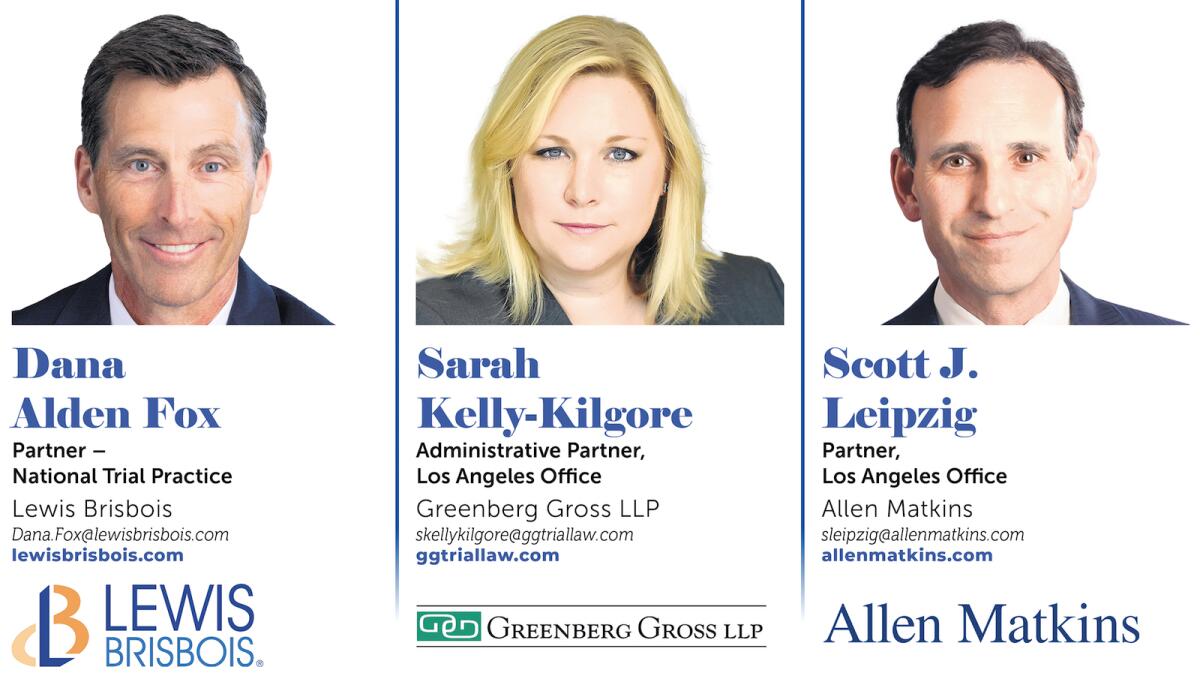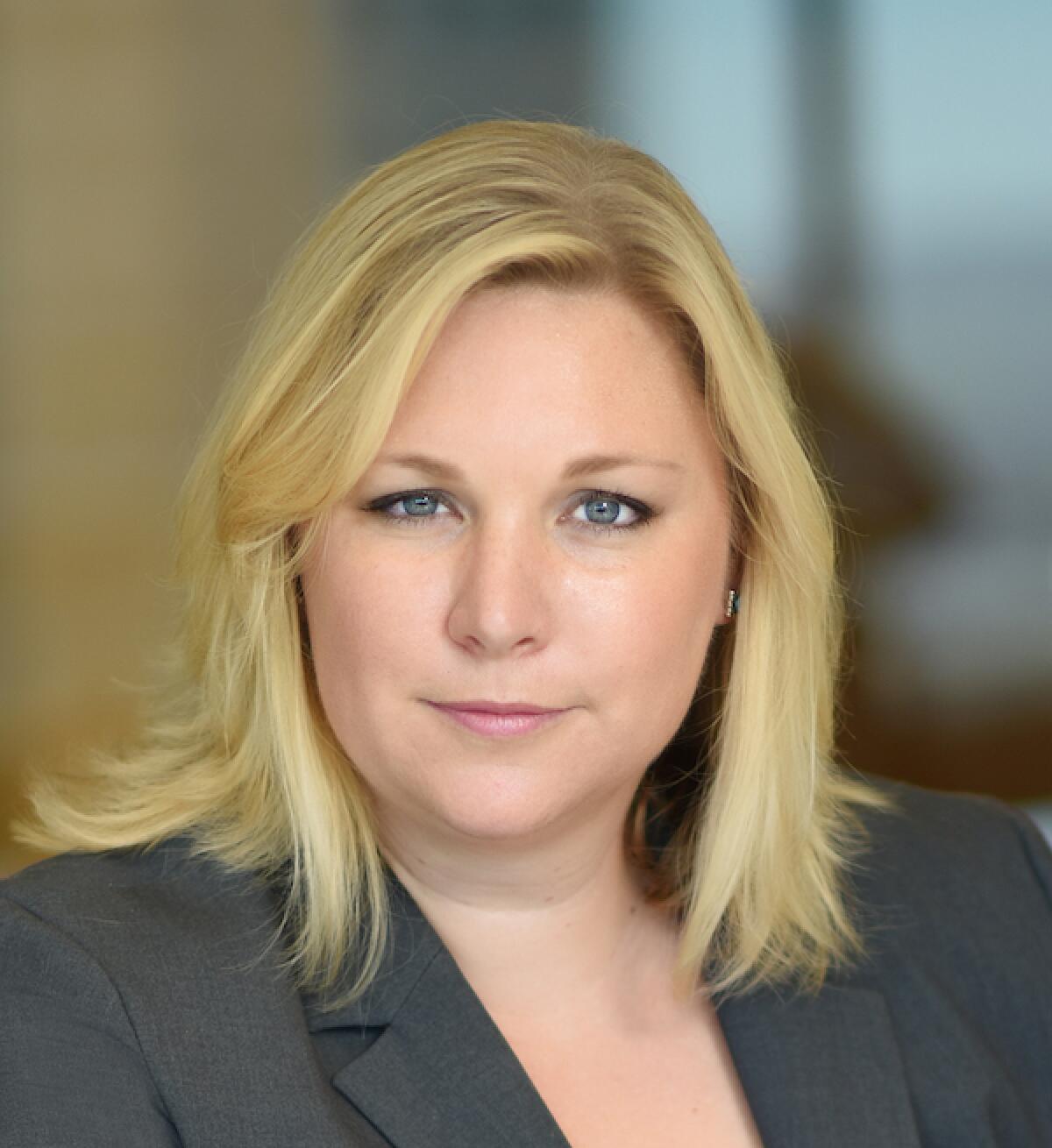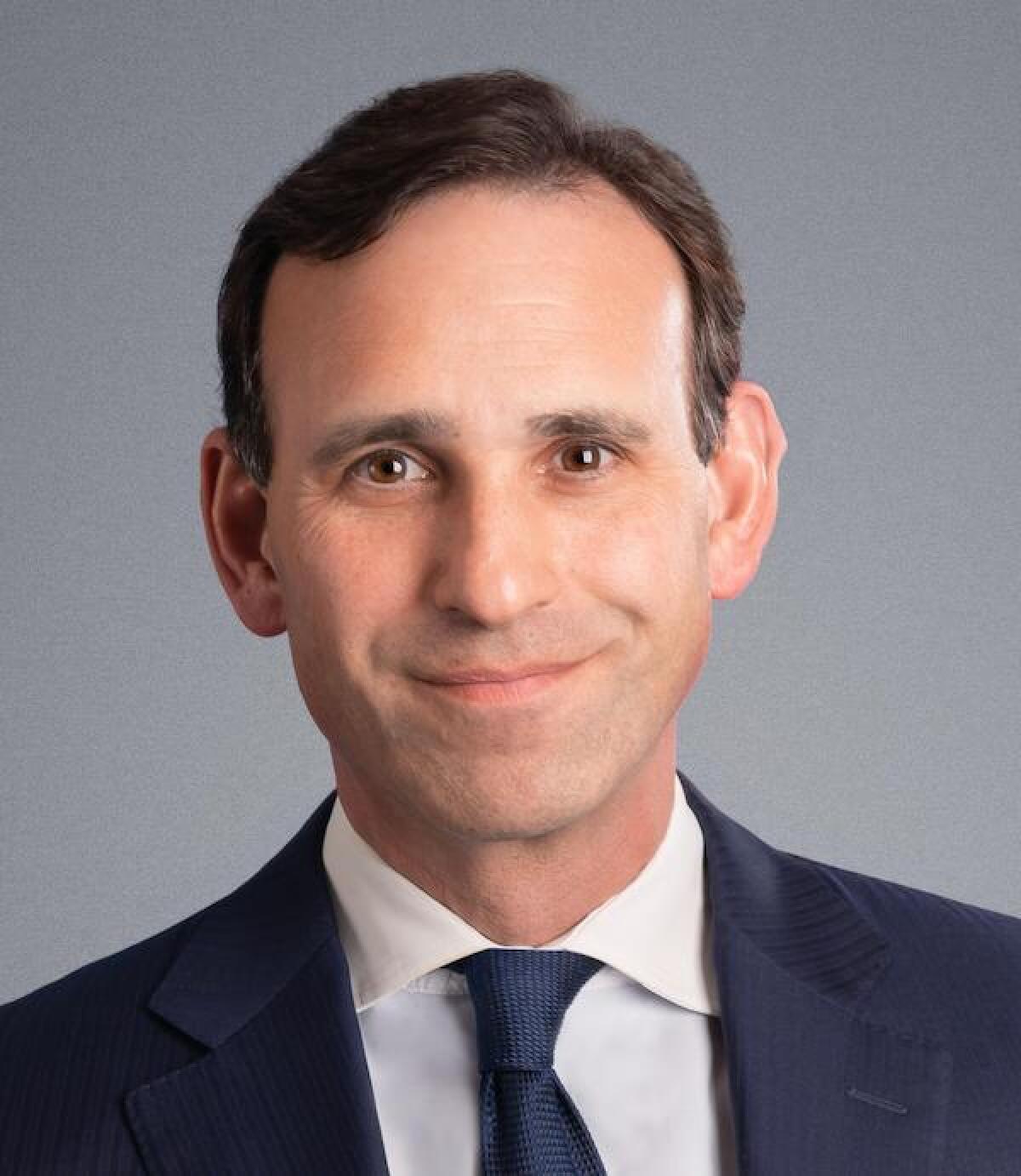Insights from Top Litigators and Trial Lawyers

The Insights from Top Litigators and Trial Lawyers panel is produced by the L.A. Times B2B Publishing team in conjunction with Allen Matkins; Greenberg Gross LLP; and Lewis Brisbois.
After the many unprecedented operational changes that businesses in every sector have had to make over the last year and a half, a whole new landscape has emerged in terms of litigation and trial law issues. This has left even the most seasoned human resources and C-suiters struggling to find answers to crucial questions. What should management be focusing on in terms of new standards, laws and protocols?
To address these issues and concerns, as well as many other topics pertaining to the world of litigation, the Los Angeles Times B2B Publishing team turned to three uniquely knowledgeable experts for their thoughts and advice about the most important “need to know” insights and to get their assessments regarding the current state of trial law, and their observations on post-pandemic trends.
Q: How has the COVID-19 pandemic affected the litigation landscape in California? Are those changes temporary, or do you think they are here to stay?

Sarah Kelly-Kilgore, Administrative Partner, Los Angeles Office, Greenberg Gross LLP The biggest change has been the shift towards remote proceedings. Before the pandemic, litigants could attend court proceedings only in person or by telephone. COVID forced the legal industry to adapt - and the hallmark of a great trial lawyer is the ability to adjust on the fly. My team and I, including our chief technology officer, have expanded our skill sets, so that we can now conduct virtual trials and traditional trials equally well. We’ve won two consecutive virtual arbitrations as a result, mostly because we quickly learned that we had to find a way to cross-examine hostile witnesses in a manner that is just as effective as what we would do in person. The California State Senate recently approved a bill that would permit remote proceedings to continue, so that the ability to succeed in remote proceedings will continue to be paramount.

Scott J. Leipzig, Partner, Los Angeles Office Allen Matkins: It’s no secret that the pandemic has dramatically affected California’s litigation landscape. The largest impact was caused by the courts essentially shutting down at the onset. Upon partially re-opening, there was such a backlog of cases that all trials were delayed. There have been some virtual bench trials (i.e. trials without juries), and a few jury trials in person, including some well-publicized ones in the Santa Monica court, but they have been few and far between. All in all, not much action! The litigation landscape also changed dramatically outside of the courtroom. Attorneys shifted (practically overnight) to practicing virtually and doing depositions, mediations and arbitrations online. Will these changes to the practice be temporary or permanent? The answer is probably somewhere in between. We will eventually get back to trying cases in the courts, but the courts will likely accommodate many more virtual hearings moving forward and will likely be much more lenient in allowing witnesses to appear virtually for trial. And much of what used to be in-person - such as depositions and mediations - will likely be virtual for the foreseeable future. Of course, significant depositions will likely still be in person, but the shifts that occurred during the pandemic will likely change litigation practice forever and the impacts will be long-lasting.

Dana Alden Fox, Partner - National Trial Practice, Lewis Brisbois: I have tried three civil jury trials to verdict in 2021, as the courts have been going through Covid-related issues. Masks have been required in all trials, and social distancing in the first. Covid protocols have made jury trials, which are always challenging to the courts and counsel, even more difficult and cumbersome. Things move slowly. Jury selection takes longer. Wearing a mask all day in court is frustrating. But the steps taken by the courts have been designed to protect the health and safety of all of us, so they are understandable.
Q: As we move deeper into 2021, what are the hot issues in litigation to be aware of?
Fox: Under a new California law effective January 1, 2022, wrongful death damages now can include compensation for the decedent’s pain and suffering pre-death. If the estate proves the decedent survived the death-causing event and experienced pain and suffering, a jury can award compensatory damages to the estate for that pain and suffering.
Q: How does someone go about finding the right litigation attorney for their particular situation?
Kelly-Kilgore: It’s quite similar to picking the right doctor for an extremely important medical procedure. The right person is going to care as much about your case - and its effect on your business - as you do. When friends need a medical procedure, I encourage them to seek out the professionals that other doctors see when in need of medical help, because, of course, doctors are the most sophisticated medical consumers there are. Similarly, sophisticated legal consumers should consider litigation attorneys called upon by other lawyers in need of legal assistance. Those top attorneys understand all aspects of litigation strategy and, like my colleagues, routinely represent not just large companies and top executives but also top firms in times of great need.
“Not having to travel through airports or sit in traffic before and after a mediation is a definite advantage; remote mediations lose the benefit of human interaction and contact.”
— – Fox
Q: How has social media affected trial law, if at all?
Leipzig: As use of social media use has ramped up over the past 10 to 15 years, it has had an increasing impact on trials. Trial law is about taking the information you have and using it to the best of your ability to achieve an outcome. Social media can help an attorney learn more about judges and their tendencies; learn more about opposing counsel and cases they have or haven’t been involved in; and learn more about potential jurors during the jury selection process. Jury selection used to be limited to juror information provided by the court, as well as the oral comments made by potential jurors. These days, lawyers and jury consultants are selecting juries by looking at all available information, including the social media accounts of potential jurors as well as other publicly available information that might bear on how a juror may feel about a case. All of this information can be used to benefit a client.
Fox: Common and easy access to social media poses a challenge to the integrity of jury trials. The Judicial Council created a pattern jury instruction informing jurors that they are not to use the internet or social media or do research regarding anything having to do with the trial in which they are a juror. Research has shown the effectiveness of that instruction is enhanced if it is read to the jury multiple times during trial. Unfortunately, however, it can be assumed that some jurors will not follow the instruction and will conduct their own research and be influenced by others outside the trial due to the internet and social media.
Q: What’s the first thing a business should do when it discovers it is being sued?
Kelly-Kilgore: Selecting the right counsel is critical. Once a complaint has been served, the company typically has just 30 days to respond. From day one on a new case, I work with my team to determine how that case will play out in the courtroom. Far too often, business litigators are not cognizant of the need to strategically map out a litigation plan - from the very beginning of the case - that maximizes the client’s ability to convincingly win in the courtroom. Ironically, developing a strategic litigation plan from the beginning decreases the likelihood that it will end up in court. When the opposition knows that it is facing real trial lawyers, they often seek early settlements to mitigate risks. Businesses should select litigation lawyers who are not just “experts” in pretrial litigation but who are, in fact, true trial lawyers.
Leipzig: There are three equally important things that a business should do right out of the gate when being sued. First, a business that is being sued should immediately tender the lawsuit and claim to its insurance company. The claim should be tendered under all possible insurance policies for all relevant years of coverage. It is important that this be done right away, as every insurance policy includes a provision that says if you don’t tender the claim on time, and the delay creates prejudice to the insurer, you can lose your coverage. Getting coverage for a lawsuit can save an insured an immense amount of money and frustration. Next, a business should put a “litigation hold” in place so that it is certain that whatever documents and communications (e.g. emails or texts) that are within the business’ control are preserved and not destroyed. If it comes out that information relevant to the claim was destroyed (called “spoliation of evidence”), a company can suffer sanctions from the court in a variety of ways. This should be avoided at all cost. Lastly, once a business is sued, it should put in place measures to ensure that there are not “unprivileged” discussions related to the claim occurring internally. Often the receipt of a lawsuit sparks internal discussion by executives and employees. Unless these communications involve a lawyer (and are thus attorney-client privileged), they are likely discoverable by the company’s adversary in the litigation and can create embarrassing and harmful evidence in the case. Everyone within the organization needs to know that they should not be communicating about the lawsuit unless a lawyer is included in the communication.
Q: What are the benefits of alternative dispute resolution? When should clients use it?
Fox: Control of one’s destiny and the outcome of the matter. During COVID, no cases were getting out to trial, so ADR was far more available for resolving cases. While not having to travel through airports or sit in traffic before and after a mediation is a definite advantage; remote mediations lose the benefit of human interaction and contact.
“The courts will likely accommodate many more virtual hearings moving forward and will likely be much more lenient in allowing witnesses to appear virtually for trial.”
— – Leipzig
Q: Are businesses entering more into arbitration vs. the courts in 2021?
Kelly-Kilgore: Yes. For example, I won two arbitration matters earlier this year and have several other arbitration matters pending. Historically, arbitration has been favored by businesses because it is not only less costly and less likely to interrupt normal business operations than court proceedings, but because it is also confidential. Businesses, in general, have been moving towards arbitration in recent years, but that trend has only accelerated during the COVID pandemic. In light of this, I and my firm have made sure that all of our lawyers are as skilled in arbitrations as they are in trials.
What percentage of cases settle compared to going to trial?
Leipzig: A huge percentage of all cases settle before trial. That number varies depending on how you define “trial” (and whether that includes arbitration), but in either event, more than 90% of all cases settle before trial.
Fox: I would estimate that 95% of civil cases settle before trial, and 98% before verdicts.
In this day and age, how fruitful is it to sue for breach of verbal contract?
Leipzig: Verbal (or oral) contracts are just as enforceable as written contracts in the state of California. Obviously, it’s easier to enforce a written contract rather than an oral one, as proof of an oral agreement necessarily involves reliance on testimony and circumstantial evidence. However, our firm’s litigation department has had a lot of success enforcing our clients’ oral agreements on very substantial matters. Under the California Revised Uniform Partnership Act (RUPA), it doesn’t take much to create an oral partnership agreement as a result of an oral agreement. Two parties merely need to decide that they will go forward in business together for their joint benefit. There is no need for specific evidence of ownership share (the law presumes a 50/50 division), and there is no need that the participation among the parties to be equal in nature. A court is empowered to supply many of the terms of the agreement under the RUPA. In today’s electronic age, there are often records of communications via email, text, or social media posts that can prove circumstantial evidence of an oral agreement. If that is the case, and with the assistance of the RUPA, it can be quite fruitful to proceed with these claims.
“Proven trial lawyers focus on trial from the very first day of their engagement and build partnerships with their clients to understand and achieve each business’s goals.”
— – Kelly-Kilgore
Q: What keeps you up at night as a litigator?
Leipzig: As a litigator, what keeps me up at night is thinking of ways to win difficult cases. This usually involves racking my brain to find an avenue or angle that will allow my client to win a case where the facts aren’t as good as I’d like them to be. I lie awake asking myself how I can use the law, or an important fact or an external factor to turn a case around and to gain much-needed leverage for settlement or to successfully try a case to a judge or jury. This is where a litigator earns his or her stripes, as there are no consolation prizes in litigation!
Q: How does a law firm specializing in trial law differentiate itself from the competition?
Kelly-Kilgore: Win. Many lawyers hold themselves out as having trial experience, but very few have taken a case all the way through trial, from complaint to judgment, and fewer still have won. Proven trial lawyers focus on trial from the very first day of their engagement and build partnerships with their clients to understand and achieve each business’s goals. Even better are the trial lawyers who have experience representing both plaintiffs and defendants - they have the most efficient approach to trial. They don’t waste time and resources fighting over ancillary issues; they’re going to focus on gathering key evidence, building a compelling narrative, and developing successful legal strategies.